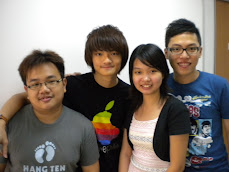
Web based learning has been implemented widely in colleges and universities nowadays, such as UKM , University of Malaya , University Malaysia Sarawak, UNITAR and Multimedia University Malaysia. E-Learning is a learning process that is facilitated and enhanced by using digital tools such as CD-ROMs, video conferencing, websites, e-mail and many more, where the content and instruction is delivered electronically.
According to a recent survey by Internetworldstats.com, Malaysia is currently ranked
among the top 20 highest number of Internet users in the World. This shows that ELearning
through the use of Internet will become increasingly more common in Malaysia
in the future. In terms of Malaysia’s E-Readiness in Southeast Asia, Malaysia just falls
behind Singapore and is currently at the embedding stage where :
1) there a general acceptance of ICT by citizens, business and government
2) Incorporation of e-business requirements into policies, legislations and regulations
3) Efforts taken to enhance international standing.
Currently, more universities are needed to cater the growing student population in Malaysia. Malaysia’s goal is to have 40% of the school leavers to enter higher education by 2020. However, it is a very high investment to build and maintain universities. As a result, one solution to this is through the creation of virtual universities or implementing
e-learning in universities and colleges. Currently, there are two virtual universities that are established in Malaysia. They are UNITAR (University Tun Abdul Razak) and Open University of Malaysia. Both of these universities currently provide courses online mainly for and working adults.
Other universities that are using e-learning as a support technologies include Universit Malaysia Sarawak and Multimedia University Malaysia. University Malaysia Sarawak came up with a plan of “setting up a virtual campus, which incorporates internal and
external elements e.g. subject, registration, appointment with lecturer and bulletin boards”. Multimedia university on the other hand, have developed their multimedia learning system. “Multimedia Learning System (MMLS) is a web-based intelligent courseware delivery engine that utilizes multimedia to enhance the teaching and learning process. MMLS was developed with the underlying concept of a virtual teacher within a virtual classroom environment. The MMLS signifies the creation of an intelligent, interactive self-paced instructor-led, web-based teaching and learning tool.” Multimedia University Malaysia currently offers distance learning courses through e-learning.
e-learning in universities and colleges. Currently, there are two virtual universities that are established in Malaysia. They are UNITAR (University Tun Abdul Razak) and Open University of Malaysia. Both of these universities currently provide courses online mainly for and working adults.
Other universities that are using e-learning as a support technologies include Universit Malaysia Sarawak and Multimedia University Malaysia. University Malaysia Sarawak came up with a plan of “setting up a virtual campus, which incorporates internal and
external elements e.g. subject, registration, appointment with lecturer and bulletin boards”. Multimedia university on the other hand, have developed their multimedia learning system. “Multimedia Learning System (MMLS) is a web-based intelligent courseware delivery engine that utilizes multimedia to enhance the teaching and learning process. MMLS was developed with the underlying concept of a virtual teacher within a virtual classroom environment. The MMLS signifies the creation of an intelligent, interactive self-paced instructor-led, web-based teaching and learning tool.” Multimedia University Malaysia currently offers distance learning courses through e-learning.
E-learning has shown its great advantages through its accessibility to all students irrespective of their residence. E-classes help students to communicate with their tutors, get clarifications regarding their subjects and study and access teaching materials through e-libraries. Universities and colleges which provide online degrees involve more and more electronic facilities to give their online students fast and qualified assistance. Students’ interactions have become much easier than face-to-face communication!
Another advantage of e-learning is its time flexibility. One can get online resources, communicate with his tutor or class mates, send his query and write term paper at any time he can get access to the Internet.
E-learning or networked learning has been becoming more and more popular among students living in developing and undeveloped countries. They can afford getting higher education degrees at respectable universities and colleges by saving extra expenses for traveling, accommodation, food and high fees for tutors. E-learning can offer such students much easier and affordable way to get a good education and a prestige higher degree.
However, there are still a few disadvantages in e-learning which are enough obvious to be omitted in this article. Lack of face-to-face communication with teachers contributes lack of understanding between a student and a teacher. While a teacher cannot easily feel a student’s demands, interests and motivations, a student can simply be lazy being non-motivated enough and having free time schedule for his e-learning. This may result a low scope of the student’s knowledge and the teacher’s accusation in lack of proficiency. Next, online classes, conferences and discussions are limited in time and totally exclude emotional interactivity. Though some universities and colleges which provide online courses and give online degrees evolve voice communication through networking technologies there is still lack of gestures, vivid dialogue and feeling of your interlocutor’s presence.
E-learning as it looks today leaves so many questions and demands regarding its improvement as it gets benefits. However, its fast growing shows a great future for online degrees. One of the most influential things which stimulate e-learning development is globalization through the Internet. The globalized world of computer technologies accepts people of different cultures irrespective of their origin, boundaries, genders, races, ages and sexes. E-learning has become an integral part of this e-world and welcomes everybody who has willingness to learn and get higher education.









0 comments:
Post a Comment